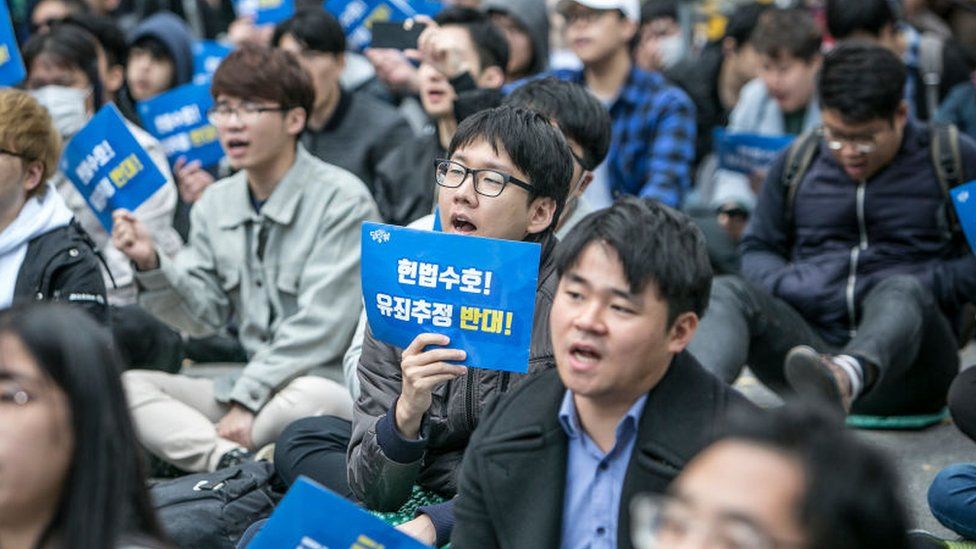-

-
-
Loading

Loading

Park Min-young, a 29-year-old activist, spends most of his day engaging with frustrated young men in Seoul. Sitting at his desk in a bustling campaign office for one of South Korea's presidential candidates, Yoon Suk-yeol, he tirelessly responds to their messages. According to Min-young, nearly 90% of men in their twenties in South Korea are either anti-feminist or do not support feminism. South Korea has one of the poorest women's rights records among developed countries, yet disgruntled young men have become the central focus of the country's presidential election. Many view feminism not as a movement for equality, but as a threat that seeks to take away their jobs and opportunities, a form of reverse discrimination. This development is disheartening for the thousands of young women who took to the streets of Seoul in 2018 to raise their voices with the "Me Too" movement, following high-profile cases of sexual harassment and "molka" (spy camera crimes). However, now their cries are being drowned out by men demanding attention with their "Me First" mentality. The next leader of South Korea will have to navigate the complex landscape of gender politics, assuming they can win the battle to secure office. The conservative candidate, Yoon, and his liberal rival, Lee Jae-myung, are currently in a close race to become the next leader of the fourth-largest economy in Asia. The top concerns for voters include surging house prices, stagnant economic growth, and persistently high youth unemployment. Interestingly, neither candidate has experience as a legislator in the National Assembly, which is a first in South Korea's democratic history. Moreover, neither party appears to have a strong female voting base, with both being accused of misogyny. Lee's ruling Democratic Party has faced numerous high-profile sexual harassment scandals, while Yoon, from the People's Power Party, pledges to abolish the Ministry of Gender Equality and Family, a move that resonates with young men who perceive themselves as seriously discriminated against. A survey conducted last year revealed that 79% of young men in South Korea feel discriminated against due to their gender. Min-young, while walking with me to meet some of these young men at a café, voices his belief that feminism has veered off track. He emphasizes the need to pacify these men and convince them before any progress can be made. These men claim they are not trying to silence women but rather amplify the voices of young men. One major concern for these men is the mandatory military service, where all South Korean men must serve 18 months before turning 30. They feel it is an unfair sacrifice without any rewards, especially when they have to face competition from women after completing their service. Additionally, the country's patriarchal system burdens women with childcare responsibilities, further exacerbating men's anxiety to prove their economic capabilities. The men I meet give speeches in support of Yoon, who adamantly denies the existence of systemic gender discrimination in South Korea. However, the facts contradict his claim. The wage gap between men and women in the country is the highest among developed nations, with women earning only 67.7% of what men do on average. Women hold a mere 5% of corporate board positions, and sentences for sexual crimes against women are often shockingly lenient, with probation being the most common outcome. Throughout this election, the struggles of young women have largely been overlooked. Only now, as the race tightens, have both candidates made efforts to regain support from women on social media. Lee promises to tackle discrimination, while Yoon declares a "war on sex crimes." However, those fighting for gender equality in South Korea are now afraid to reveal their identities due to the increased hostility they face. In a conversation with a group of two men and two women who request anonymity, Ji-eun, a YouTuber in her early 20s, explains the consequences of being a feminist in South Korea. When they upload videos discussing feminism on their YouTube channel, they are subjected to organized attacks by male communities who threaten them with hateful comments like "You are a feminist? Feminists should all die." This cyberbullying takes a toll and has even led to tragic outcomes such as the suicide of YouTuber BJ Jammi. Despite moments of understanding, particularly concerning the unjust nature of mandatory military service, Ji-eun still feels hopeless about her future. She expresses doubt that change can be achieved when her own generation seems to harbor so many anti-feminist sentiments. South Korea stands at a cultural crossroads, with a tech-savvy younger generation that holds different views than their parents and grandparents. Both genders continue to push for change and look to those in power for real progress. However, the current state of anti-feminist backlash poses a challenge for future leaders who must address these deep divisions. The fight for gender equality in South Korea remains uncertain, but the hope persists that with time and effort, a brighter future can emerge.